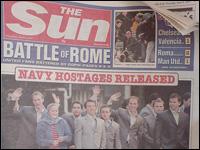Transcript
BROOKE GLADSTONE:
From WNYC in New York, this is NPR's On the Media. I'm Brooke Gladstone.
BOB GARFIELD:
And I'm Bob Garfield. On Wednesday at a press conference in Tehran, Iranian President Mahmoud Ahmadinejad announced he was bestowing a gift on the British people by releasing 15 British naval officers detained in Iran for nearly two weeks. By Thursday they were home, but if this was, as many suggest, some kind of bizarre power play, who won?
We asked Los Angeles Times Mideast correspondent Borzou Daragahi, who covered the story from Tehran and then from Cairo, where he is now. He told us that satellite TV outlets in the region approached the situation with far cooler heads than the Western media – that, in fact…
BORZOU DARAGAHI:
They were basically just presenting this as a simple border dispute, and so it was very sympathetic to the Iranian point of view, both on the Jazeera and Arabiya network and in the newspapers.
Another interesting point was the sort of suggestion that they were being paraded about. It was not reflected in the way Arabs and Iranians saw this. They didn't see it as a humiliation of the British soldiers. They saw them being well treated and, you know, treated as guests, and they interpreted it very differently than Tony Blair interpreted it, which was as a violation of international law.
BOB GARFIELD:
Although the Geneva Convention expressly forbids using captives or detainees for any kind of propaganda purposes.
BORZOU DARAGAHI:
Yeah, absolutely. Personally, I think this definitely crossed the line. But in the eyes of many people, it was rather comic and light, you know, with how relaxed they were, eating pistachios and so on. People thought it was rather amusing.
BOB GARFIELD:
Is it fair to say that the reaction to the story in the press reflected just a general hostility and suspicion towards Britain and the West, as opposed to the particulars of this incident?
BORZOU DARAGAHI:
I think that's absolutely the case. And, as a matter of fact, depending on how anti-American the media outlet was is just how sympathetically Iran was portrayed in this whole thing.
For example, Al-Arabiya, which is the number two Arabic-language news channel in the world - it's partly owned by the Saudis, who are concerned about Iran's rising influence in the region – was much more balanced in its coverage with regard to who was in the right and who was portrayed positively.
On the other hand, Al-Jazeera, which is more oriented toward the rest of the Arab world, it portrayed Ahmadinejad very, very positively, and, as a matter of fact, emphasized the fact that Ahmadinejad was releasing these guys as an act of charity – and they kept saying that over and over again - what a nice generous guy this is for releasing these sailors as an act of forgiveness in the spirit of the Prophet Mohammed.
BOB GARFIELD:
There's a recurring theme in Western coverage, and that is that this is a Pyrrhic victory for Ahmadinejad, because while he may have gained short-term advantage by humiliating Britain, it just further isolates Iran politically and economically from the West. Did you hear any of that in the analysis in the regional media?
BORZOU DARAGAHI:
You know where I read it a lot was in the Iranian press. A lot of the moderates in Iran, a lot of the more opposition figures who are tolerated and they publish newspapers and publish columns and blogs and so on, there was a lot of concern about that, that Ahmadinejad will score his quick, easy, cheap nationalist victory but harm Iran's interest in the long run.
It wasn't in the broadcast outlets, because in Iran the broadcast outlets are controlled by the most conservative elements in the government, but it was definitely in the newspapers.
BOB GARFIELD:
It seems to me that historically if Arab countries, or, in this case, Iran, are defiant of the West and stand up to the West, no matter how self-defeating, they get credit in the region for being a player. Is Ahmadinejad more of a player in the Mideast for having captured a boat full of young sailors?
BORZOU DARAGAHI:
I think that's basically what happened here. He defied the West. He stuck a thumb in the eye of Britain, which has a long and storied history in the Middle East, resented by a lot of people here locally, and he got away with it. And he sent a message, in the eyes of many people to the West, that we are a regional power and we will not allow you to violate our territory.
And that's how many people here view this, as Iran standing up for its rights.
BOB GARFIELD:
When you're covering these stories in the Middle East, stories about opinion towards the West, do you feel like [LAUGHS] arguing with the people you're interviewing with and sort of setting them straight? Or does it make you sort of question your own assumptions about how the world works?
BORZOU DARAGAHI:
Well, I mean, I constantly try to question my own assumptions about how the world works, but I definitely question constantly, in their face – it's part of the fun of this job at confronting people occasionally - is like, look, how can you be so anti-Western and you're wearing like Adidas running shoes and you're watching The Simpsons and you're cracking up? Don't you see a contradiction there?
So I'm always engaging in debates like that with people, and it's part of what makes the job so interesting.
BOB GARFIELD:
Okay, Borzou. Well, thank you so much for joining us.
BORZOU DARAGAHI:
It's been a pleasure.
BOB GARFIELD:
Borzou Daragahi is a Mideast correspondent for The Los Angeles Times.

